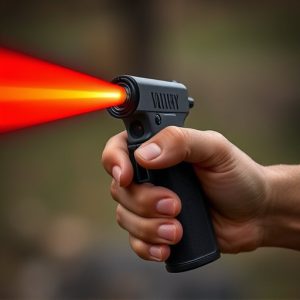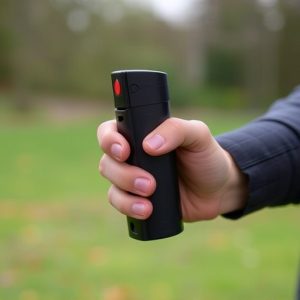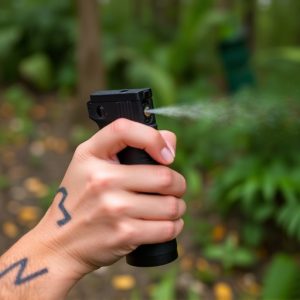Effective Alternatives to Guns: A Guide to Legal and Ethical Non-Lethal Self-Defense Devices
Non-lethal alternatives to guns such as pepper spray, stun guns, and personal alarms are gaining pop…….
Non-lethal alternatives to guns such as pepper spray, stun guns, and personal alarms are gaining popularity as effective self-defense tools. Pepper spray temporarily blinds and incapacitates an attacker with irritation, providing an escape route. Stun guns deliver a high-voltage shock to subdue without causing lasting harm, suitable for various scenarios. Personal alarms emit a loud noise to deter assailants and alert bystandlers. Martial arts or self-defense training complements these tools, offering preventive skills that avoid the need for force. It's crucial to understand local laws regarding defensive tools and to choose devices that align with one's personal abilities and the environments they frequent. These non-lethal options serve as a last resort after de-escalation efforts have failed, ensuring personal safety without employing lethal violence. Users should research and select their self-defense mechanisms carefully, considering both legal allowances and ethical implications, to ensure they are prepared for unexpected threats.
In an era where personal safety is paramount, the quest for effective self-defense devices often leads individuals beyond traditional methods. This article delves into the world of non-lethal alternatives to guns, offering a comprehensive exploration of their use, legality, and ethical implications. We will analyze top self-defense devices—stun guns, pepper spray, and personal alarms—providing insights into their effectiveness and role in personal security strategies. As we navigate these options, consider how alternative weapons to guns can offer a safer way to protect oneself without the lethal consequences of firearms.
Exploring Non-Lethal Self-Defense Alternatives to Guns
In recent years, the conversation around self-defense has increasingly recognized the importance of non-lethal alternatives to traditional firearms. These options serve as effective deterrents against potential aggressors while ensuring the safety of both the individual and the assailant. Pepper spray, for instance, is a widely accepted and legally permissible tool that can incapacitate an attacker with a highly irritating mist, buying valuable time to escape. It is compact, easy to carry, and its effects are temporary, reducing the likelihood of long-term harm. Stun guns, or electric self-defense weapons, offer another layer of protection. They deliver a high-voltage shock that can subdue an assailant without causing permanent injury. These devices come in various forms, from handheld stunners to keychain models, making them versatile and discreet for daily carry.
Beyond chemical agents and electric shocks, personal alarms are also emerging as a powerful non-lethal self-defense device. The piercing sound of an alarm can attract attention and deter an attacker by signaling to bystanders that help is needed. Additionally, devices like personal safety whistles can be just as effective in signaling for assistance. Training in martial arts or self-defense techniques is another alternative, offering a proactive approach to personal safety. It empowers individuals with the skills to avoid confrontations and defend themselves if necessary. These non-lethal self-defense devices and practices are crucial components of an individual’s safety toolkit, providing effective alternatives to guns that align with the desire for security without resorting to lethal force.
The Role of Legal and Ethical Considerations in Choosing Non-Lethal Weapons for Self-Defense
When considering self-defense strategies, the choice of non-lethal weapons is paramount, particularly given the legal and ethical implications associated with their use. Legal frameworks govern the types of defensive tools permissible in various jurisdictions, thereby influencing the selection process. It is crucial to understand local laws regarding self-defense devices to avoid legal repercussions that could arise from their unauthorized or improper deployment. Ethical considerations also play a significant role; individuals must weigh the potential consequences of using force against an attacker, considering the well-being and safety of all parties involved. Alternative weapons to guns, such as pepper spray, stun guns, and personal alarms, offer effective deterrents without the risk of causing permanent harm or fatality. These devices are specifically designed for incapacitating an assailant long enough for one to escape or for law enforcement to intervene. Moreover, the choice of non-lethal self-defense tools should align with one’s personal capabilities and the specific scenarios they aim to prepare for. For instance, a stun gun may be more suitable for someone in a urban environment, while pepper spray could be a better fit for another who frequents natural settings where loud noises might be more disruptive. In all cases, the priority is to ensure that the chosen device serves as a last resort, after de-escalation attempts have been made and when there is a clear and present danger to one’s safety. Thus, individuals should conduct thorough research on the legal allowances in their area, understand the ethical responsibilities of self-defense, and select non-lethal weapons that offer both protection and compliance with societal norms and laws.
In-Depth Analysis of Top Self-Defense Devices: Stun Guns, Pepper Spray, and Personal Alarms
When considering non-lethal means for personal protection, self-defense devices serve as alternative weapons to firearms, offering a safer and more controlled option for deterring attackers. Among the most effective and widely recognized are stun guns, pepper sprays, and personal alarms. Stun guns provide a temporary incapacitation by delivering an electrical shock that can disorient an assailant without causing long-term injury. Their effectiveness lies in their ability to create a significant barrier against physical aggression, making them a reliable choice for those looking for a less dangerous alternative to traditional firearms. Pepper sprays, on the other hand, use a powerful chemical agent to cause irritation and temporary blindness upon contact with mucous membranes. This incapacitating effect gives the user valuable time to escape or seek help. Personal alarms, often small and easily carried, emit a loud audible sound that can attract attention and deter would-be attackers by alerting others to potential danger. The use of these devices as alternative weapons to guns underscores their importance in personal safety strategies, ensuring individuals have a means to protect themselves without resorting to lethal force. Each device has its specific use cases and scenarios where they prove most effective, and understanding the distinctions between them is crucial for anyone seeking to enhance their self-defense capabilities with non-lethal options.


